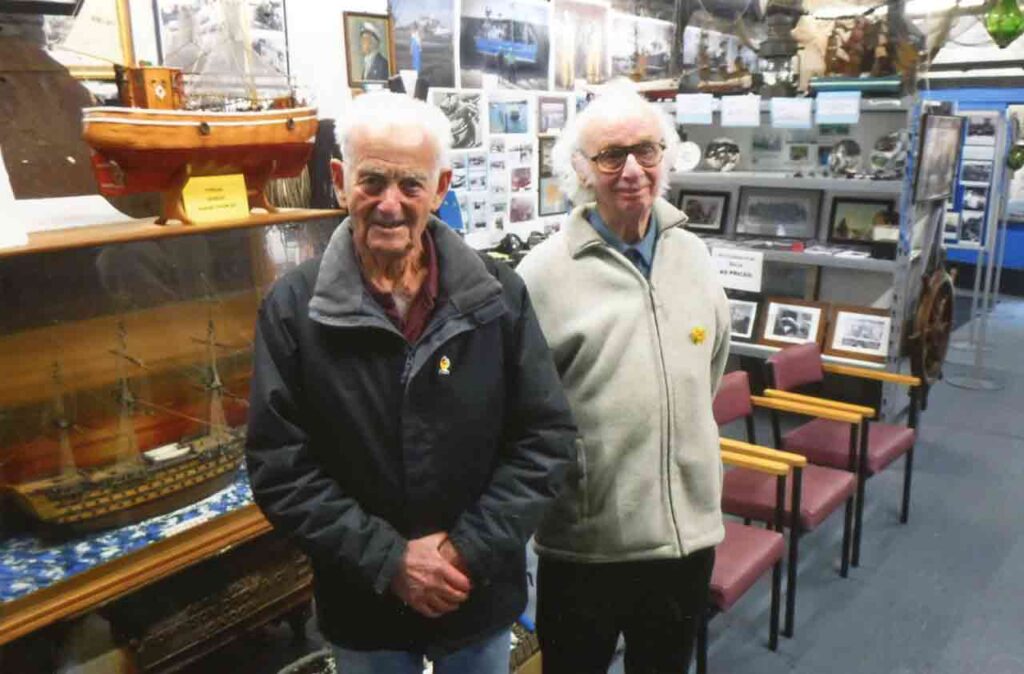Entrance to the Museum and Plimsoll Memorial Photo: Ray Duff
Words and photos: Ray Duff – Once again, the excellent Fishing History Museum—nestled within the charming seaside quarter of Folkestone near the inner harbour—has swung open its doors to the eager public.
Hosts and local historians Alan Taylor and Frank Bond are on hand to guide visitors through the museum’s rich and diverse collections, which showcase the fascinating history of fishing. Among the treasures are relics from the building’s past, including items crafted by Ovenden’s forge—a hub of local trade craftsmanship.
What Awaits Visitors: A Glimpse into Maritime Heritage

L-R: Alan Taylor and Frank Bond await visitors to their Museum Photo: Ray Duff
The museum boasts an impressive array of fishing materials, captivating paintings, delicate china, vintage lamps, and other intriguing artefacts. Engaging video displays provide immersive glimpses into the lives of fishermen and the maritime world. Additionally, the museum continually updates its related information, ensuring that visitors always discover something new.
Channel Ferries and Local History
Beyond fishing, the museum also sheds light on the Channel Ferries that have connected Folkestone to distant shores. These vessels have played a vital role in the town’s history, facilitating trade, travel, and cultural exchange.
Two Remarkable Bicentenaries
This year marks the bicentenaries of two significant events:
- The RNLI (Royal National Lifeboat Institution): For two centuries, this heroic organization has been saving lives at sea. While Folkestone once had its own lifeboat in the 19th and early 20th centuries—launched from the beach near Marine Crescent—the torch now passes to stations at Littlestone, Dungeness, and nearby Dover. Notably, the Littlestone station’s legacy dates back to 1822.
- Samuel Plimsoll: Born in Bristol in 1824, Samuel Plimsoll championed the cause of seafarers. As a coal mine owner and Liberal MP for Derby, he fought tirelessly for safety at sea. In 1876, after a prolonged battle, he succeeded in introducing the “load-line” system for vessels. This crucial measure prevented overloading, which had tragically led to the sinking of many ships—resulting in loss of life and uninsured cargo. Samuel Plimsoll’s legacy endures, and his memorial graces the outside wall of the museum on Back Street.
As we honour these anniversaries, the Folkestone Town Council will continue its tradition of holding the annual memorial for Samuel Plimsoll at St. Martin’s Churchyard in Cheriton on June 1st.
The Fishing History Museum stands as a testament to Folkestone’s maritime heritage, preserving stories of courage, trade, and the sea. Whether you’re a history enthusiast or simply curious, this museum invites you to explore the depths of the past and celebrate the remarkable individuals who shaped it.
More information
Folkestone Fishing History Museum – 2 Radnor Street and Back Street (Main public Entrance)
Open- Daily from 1030am – 4pm.
The Museum is also a member of the Wheels of Time campaign:
Fishing History Museum – https://folke.life/folkestone/places/folkestone-fishing-museum/
RNLI Bicentenary – https://rnli.org/about-us/our-history/2024
Samuel Plimsoll Bicentenary –
https://en-gb.facebook.com/FolkestonePlimsollMemorialCampaign/
https://www.lr.org/en/knowledge/horizons/march-2024/plimsoll-at-200-the-legacy-beyond-the-load-line/
